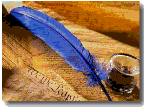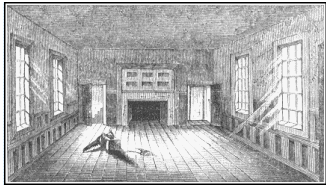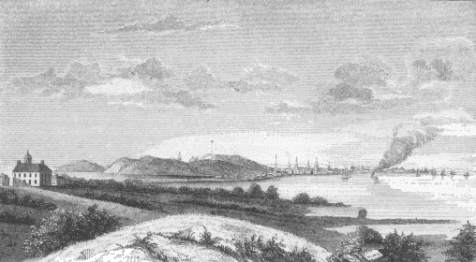
The Declaration of Independence
Thomas Jefferson's Account

Committee preparing the Declaration
Nothing of particular excitement occurring for a considerable time our countrymen seemed to fall into a state of insensibility to our situation. The duty on tea not yet repealed & the Declaratory act of a right in the British parliament to bind us by their laws in all cases whatsoever, still suspended over us. But a court of inquiry held in R. Island in 1772 [*see note in commentary following], with a power to send persons to England to be tried for offences committed here was considered at our session of the spring of 1773 as demanding attention. Not thinking our old & leading members up to the point of forwardness & zeal which the times required, Mr. Henry, R. H. Lee, Francis L. Lee, Mr. Carr & myself agreed to meet in the evening in a private room [the Apollo room, pictured below] of the Raleigh to consult on the state of things.
*The date 1762 was given here in three different renditions of Jefferson's Autobiography. I have edited it to 1772 for the following reasons: The date is inconsistent with "...was considered at our session of the spring of 1773 as demanding attention." Any incident over ten years in the past would have been of little interest, even to the House of Burgesses. Though the vice-admiralty courts were established throughout the colonies shortly after the French and Indian War, I was unable to locate any specific incident concerning a court of inquiry in Rhode Island in 1762. The Gaspee affair, in 1772, did result in a special court of inquiry, charged with the authority that Jefferson describes here.
The Committees of Correspondence were formed throughout the colonies as a means of coordinating action against Gr. Britain. Many were formed by the legislatures of the respective colonies, others by extra-governmental associations such as the Sons of Liberty in the various colonies. In any case, the members of these organizations represented the leading men of each colony. It took some time, and finally an act as dramatic as the Boston Port Bill, to coordinate the colonies in action against Gr. Britain.
Circular Letters were a common method of communications between the colonies. They were written by committees of correspondence, by the various legislatures, by town councils, and the Sons of Liberty organizations. These letters circulated in many copies from colony to colony and were often printed in the colonial papers or posted in public.
There may have been a member or two more whom I do not recollect. We were all sensible that the most urgent of all measures was that of coming to an understanding with all the other colonies to consider the British claims as a common cause to all, & to produce an unity of action: and for this purpose that a committee of correspondence in each colony would be the best instrument for intercommunication: and that their first measure would probably be to propose a meeting of deputies from every colony at some central place, who should be charged with the direction of the measures which should be taken by all.

The Apollo Room of the Raleigh Tavern, circa 1750
We therefore drew up the resolutions which may be seen in Wirt pa 87. The consulting members proposed to me to move them, but I urged that it should be done by Mr. Carr, my friend & brother in law, then a new member to whom I wished an opportunity should be given of making known to the house his great worth & talents. It was so agreed; he moved them, they were agreed to nem. con. and a committee of correspondence appointed of whom Peyton Randolph, the Speaker, was chairman.
The Govr. (then Ld. Dunmore) dissolved us, but the committee met the next day, prepared a circular letter to the Speakers of the other colonies, inclosing to each a copy of the resolutions and left it in charge with their chairman to forward them by expresses.
The house disbanded & moved to the private accommodation at the Raleigh. This marked the transition of Virginia from a regal government to an independent one. Though Dunmore would convene the house once more, about a year from that day, in order to consider a plan of reconciliation offered by Lord North, The Association was to be the only popularly recognized government in Virginia until the onset of war.
Rhode Island was the first to respond to the Virginia Association of May by adopting similar measures. The Massachusetts House of Representatives followed in kind on May 28th. These acts and others like them, laid the groundwork for the union of the colonies in a General Congress.
The next event which excited our sympathies for Massachusetts was the Boston port bill, by which that port was to be shut up on the 1st of June, 1774. This arrived while we were in session in the spring of that year. The lead in the house on these subjects being no longer left to the old members, Mr. Henry, R. H. Lee, Fr. L. Lee, 3 or 4 other members, whom I do not recollect, and myself, agreeing that we must boldly take an unequivocal stand in the line with Massachusetts, determined to meet and consult on the proper measures in the council chamber, for the benefit of the library in that room. We were under conviction of the necessity of arousing our people from the lethargy into which they had fallen as to passing events; and thought that the appointment of a day of general fasting & prayer would be most likely to call up & alarm their attention. No example of such a solemnity had existed since the days of our distresses in the war of '55, since which a new generation had grown up. With the help therefore of Rushworth, [a popular book, John Rushworth's Historical Collections] whom we rummaged over for the revolutionary precedents & forms of the Puritans of that day, preserved by him, we cooked up a resolution, somewhat modernizing their phrases, for appointing the 1st day of June, on which the Port bill was to commence, for a day of fasting, humiliation & prayer, to implore heaven to avert from us the evils of civil war, to inspire us with firmness in support of our rights, and to turn the hearts of the King & parliament to moderation & justice. To give greater emphasis to our proposition, we agreed to wait the next morning on Mr. Nicholas, whose grave & religious character was more in unison with the tone of our resolution and to solicit him to move it. We accordingly went to him in the morning. He moved it the same day; the 1st of June was proposed and it passed without opposition. The Governor dissolved us as usual.
We retired to the Apollo as before, agreed to an association, [see comments above] and instructed the committee of correspondence to propose to the corresponding committees of the other colonies to appoint deputies to meet in Congress at such place, annually, as should be convenient to direct, from time to time, the measures required by the general interest: and we declared that an attack on any one colony should be considered as an attack on the whole. This was in May. We further recommended to the several counties to elect deputies to meet at Williamsburg the 1st of August ensuing, to consider the state of the colony, & particularly to appoint delegates to a general Congress, should that measure be acceded to by the committees of correspondence generally. It was acceded to, Philadelphia was appointed for the place, and the 5th of September for the time of meeting. We returned home, and in our several counties invited the clergy to meet assemblies of the people on the 1st of June, to perform the ceremonies of the day, & to address to them discourses suited to the occasion.

View of Boston from Dorchester Heights
The idea offered by A Summary View was so popular with the members of the Congress that, though they could not adopt it, they did have it printed and then forwarded to England. Nowhere in the article was the author identified, yet Jefferson's authorship was well known at the time.
Jefferson was misinformed regarding the English edition. The ministry did modify & distribute the work, however Edmund Burke had it reprinted in the popular press with only slight modifications to format.
The people met generally, with anxiety & alarm in their countenances, and the effect of the day thro' the whole colony was like a shock of electricity, arousing every man & placing him erect & solidly on his centre. They chose universally delegates for the convention.
Being elected one for my own county I prepared a draught of instructions [see comments above] to be given to the delegates whom we should send to the Congress, and which I meant to propose at our meeting. In this I took the ground which, from the beginning I had thought the only one orthodox or tenable, which was that the relation between Gr. Br. and these colonies was exactly the same as that of England & Scotland after the accession of James & until the Union, and the same as her present relations with Hanover, having the same Executive chief but no other necessary political connection; and that our emigration from England to this country gave her no more rights over us, than the emigrations of the Danes and Saxons gave to the present authorities of the mother country over England. In this doctrine however I had never been able to get any one to agree with me but Mr. Wythe. He concurred in it from the first dawn of the question What was the political relation between us & England? Our other patriots Randolph, the Lees [F.L. Lee, R.H. Lee], Nicholas, Pendleton stopped at the half-way house of John Dickinson who admitted that England had a right to regulate our commerce, and to lay duties on it for the purposes of regulation, but not of raising revenue. But for this ground there was no foundation in compact, in any acknowledged principles of colonization, nor in reason: expatriation being a natural right, and acted on as such, by all nations, in all ages. I set out for Williamsburg some days before that appointed for our meeting, but was taken ill of a dysentery on the road, & unable to proceed. I sent on therefore to Williamsburg two copies of my draught, the one under cover to Peyton Randolph, who I knew would be in the chair of the convention, the other to Patrick Henry. Whether Mr. Henry disapproved the ground taken, or was too lazy to read it (for he was the laziest man in reading I ever knew) I never learned: but he communicated it to nobody. Peyton Randolph informed the convention he had received such a paper from a member prevented by sickness from offering it in his place, and he laid it on the table for perusal. It was read generally by the members, approved by many, but thought too bold for the present state of things; but they printed it in pamphlet form under the title of "A Summary view of the rights of British America." It found its way to England, was taken up by the opposition, interpolated a little by Mr. Burke so as to make it answer opposition purposes, and in that form ran rapidly thro' several editions. This information I had from Parson Hurt, who happened at the time to be in London, whether he had gone to receive clerical orders. And I was informed afterwards by Peyton Randolph that it had procured me the honor of having my name inserted in a long list of proscriptions enrolled in a bill of attainder commenced in one of the houses of parliament, but suppressed in embryo by the hasty step of events which warned them to be a little cautious. Montague, agent of the House of Burgesses in England made extracts from the bill, copied the names, and sent them to Peyton Randolph. The names I think were about 20 which he repeated to me, but I recollect those only of Hancock, the two Adamses [John, Samuel], Peyton Randolph himself, Patrick Henry, & myself.1
The convention met on the 1st of August, renewed their association, appointed delegates to the Congress, gave them instructions very temperately & properly expressed, both as to style & matter; and they repaired to Philadelphia at the time appointed.
The splendid proceedings of that Congress at their 1st session belong to general history, are known to every one, and need not therefore be noted here. They terminated their session on the 26th of October, to meet again on the 10th May ensuing. The convention at their ensuing session of Mar, '75, approved of the proceedings of Congress, thanked their delegates and reappointed the same persons to represent the colony at the meeting to be held in May: and foreseeing the probability that Peyton Randolph their president and Speaker also of the House of Burgesses might be called off, they added me, in that event to the delegation.
Footnotes
1 See Girardin's History of Virginia, Appendix No. 12, note.
Start page | The Document | A Reading | Signers | Related Information | Jefferson's Account | Declaration House | Declaration Timeline | Rev. War Timeline | More Resources |






